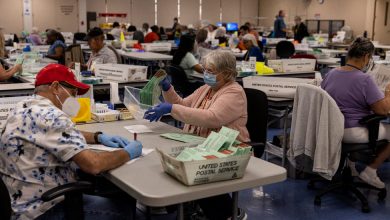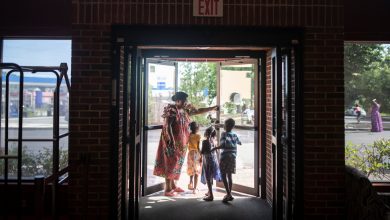They Grew Up Legally in the U.S., but Can’t Stay After They Turn 21

WASHINGTON — In 2011, after five years of working and living with his family in the United States on a temporary visa, Barathimohan Ganesan submitted green card applications for his wife, his 5-year-old daughter and his 11-year-old son.
Mr. Ganesan, an Indian citizen who has also lived in Singapore and Australia, was nervous about when his wife and children might gain permanent residency. He knew the waiting list was especially long for Indians on his kind of visa, an H-1B, which allows American companies to employ skilled foreign workers. Because of chronic backlogs, it can take years to process those on work visas who apply for permanent residency.
Last year, a decade after he applied, Mr. Ganesan, his wife and his daughter received their green cards. But his son had turned 21 and missed the cutoff by months, leaving him scrambling for a visa that would allow him to stay in the United States.
Mr. Ganesan’s son is among more than 200,000 children who grew up in the country under the protection of their parents’ temporary visas, which can be renewed indefinitely. But the children risk losing their legal status when they turn 21. Unable to become permanent residents because of the backlogs or because they were never eligible, they must obtain a different visa, remain in the United States without legal status or leave entirely. According to the Cato Institute, more than 10,000 children age out of green card eligibility each year; untold numbers eventually depart, often leaving their families behind.
These young people do not qualify for the Deferred Action for Childhood Arrivals program. Created by executive action during the Obama administration, the DACA program protects from deportation about 650,000 youths, or Dreamers, who were brought into the United States and have remained without legal status. Because the program requires applicants to be undocumented, it does not offer those with legal status a way to stay.
A comprehensive immigration overhaul is highly unlikely to pass a deadlocked Congress in a midterm election year. The Biden administration has been under increasing pressure as a Trump-era public health order, known as Title 42, is set to be lifted in late May, a move that is expected to create a surge of migration across the southwestern border. A bipartisan group of senators restarted immigration discussions on Thursday to try to identify stand-alone proposals that would have the support of both parties.
When asked on Thursday whether the administration — which is updating DACA — was considering extending protections to documented youths, Alejandro N. Mayorkas, the homeland security secretary, told the House Judiciary Committee that the department did not plan to do so. Its focus was “to fortify the existing DACA program” and shift responsibility for documented youths to Congress, he said, adding that their situation spoke to “the imperative to pass immigration reform.”
In interviews, more than a dozen people who lived in the United States on temporary visas from a young age described their struggles with anxiety and the financial burden of navigating how to remain in the country they considered home. They are urging the Biden administration, if it will not provide a path to citizenship, to offer a way for them to legally remain in the country.
Mr. Ganesan’s son, Niranjan Barathimohan, is able to stay in the United States until November only because immigration officials extended his dependent visa. Mr. Barathimohan, a student at the University of Texas at Dallas, will have to go to Singapore, where he was born, to apply for a student visa that will allow him to return and finish his degree.
His application might be rejected; since he previously tried for a green card, he has shown an intent to immigrate to the United States, which is not allowed. Applicants may be asked to show that they intend to leave the country after completing their courses. Mr. Barathimohan faces the prospect of being stuck in Singapore, where he has no family or roots.
Read More About U.S. Immigration
- At the Border: Gov. Greg Abbott of Texas hoped to crack down on smuggling with safety inspections. Facing snarled traffic and political backlash, he had to backtrack.
- ‘Remain in Mexico’ Program: The Supreme Court is hearing arguments over whether the Biden administration can end a policy forcing asylum seekers to await approval in Mexico.
- Undocumented Immigrants: As it ends contracts and looks to reduce bed capacity at detention facilities, the government appears to be moving away from incarcerations.
- Trump-Era Policies: President Biden vowed to unravel Trump-era immigration rules. Disagreements inside the White House have complicated that effort.
“How is he going to manage alone?” Mr. Ganesan said. “I was really devastated that just because of my country of birth, my son’s opportunities are very limited.”
While there are protections to keep families together when parents move to the United States on temporary work visas, those end when children turn 21 because they are no longer considered part of the family unit.
“I don’t think people who originally wrote the laws foresaw a situation where children brought here on visas would be raised and educated here, but not have a clear opportunity to stay and become Americans,” said Dip Patel, the founder of Improve the Dream, an organization that campaigns for a path to citizenship for those children. “Delay in taking action will not only lead to tearing more families apart, but also continue the immense emotional turmoil faced by thousands of families.”
Other families face similar situations. Like Mr. Ganesan, Deva and her husband moved their children to the United States from India when they were young. For more than a decade, the children and Deva, who asked to be identified by a nickname, lived as dependents on her husband’s indefinite work visa.
Deva said her husband’s employer, an American automaker, could decide at any point not to extend his visa, which must be renewed every three years. She said she feared antagonizing the employer if she was identified speaking publicly about her family’s situation.
The family’s hopes of staying together in the United States ended in December, when Deva’s daughter turned 21. Having exhausted appeals for an extension and unable to apply for a different visa, the daughter moved to Canada days later.
The effects on the family were far-reaching. A week before her daughter was set to leave, Deva said, her son, now 17, tried to hurt himself, alarming his sister. She postponed her departure by a week while the family sought counseling for him.
Her son said during counseling that he had struggled with his mental health for months while watching his family navigate their legal status, Deva said. Her daughter, who enrolled in a master’s program in Canada, is less than an hour’s drive from her friends and family, but cannot enter the United States while she waits for a tourist visa.
At a Senate hearing in March, Senator Richard J. Durbin, Democrat of Illinois and the chairman of the Judiciary Committee, and Senator John Cornyn of Texas, the top Republican on the panel’s immigration subcommittee, vowed to work on legislation to help people who had grown up in the United States without a clear path to citizenship.
In emotional testimony at the hearing, Athulya Rajakumar, 23, spoke of the toll of growing up in Seattle as a dependent of her single mother, who had a temporary work visa. She described how she and her brother struggled with depression and how her family’s status as temporary visa holders hindered him from receiving the treatment he needed. He later took his own life.
“We didn’t know how badly it was going to affect us,” Ms. Rajakumar, who lives in Texas on a work visa, said in an interview.
Muzaffar Chishti, the director of the Migration Policy Institute at the N.Y.U. School of Law, described the issue as one of many in a system that has not been truly updated since the Immigration and Nationality Act of 1952, which established the pathways for legal immigration that are still in place.
“Immigration is not a set of policies — it’s a system,” Mr. Chishti said, adding, “If one part of the system gets problematic, it affects other parts of the system.”
Those who grew up in the United States on certain temporary visas are not eligible to apply for permanent residency. That was the case for Summer Rusher, who was born in Britain and moved to Florida at age 1 with her parents, who arrived on an investor visa, which allows some foreign citizens to reside in the country indefinitely if they invest in an American business. The program does not offer a path to citizenship, meaning that children have no way to become permanent residents.
Ms. Rusher, 23, was able to stay on a student visa after she turned 21. She graduated from Southeastern University at the top of her class in a master’s program for exceptional-student education, a certification in Florida for instructors of students with disabilities.
Now a teacher in Winter Haven, Fla., Ms. Rusher was among a large pool of applicants for a limited number of work visas. But she learned in March that she was not chosen in the randomized process used by U.S. Citizenship and Immigration Services. If she cannot obtain another visa before her work authorization expires in June, she will have to return to Britain, where her qualifications are not recognized.
Short of a legislative overhaul of the system, Improve the Dream, the advocacy group, has worked to increase awareness of the issue and is urging the Biden administration to make changes. But children of nonimmigrant visa holders have criticized the administration for being too slow or unwilling to take action on proposed changes, such as the expansion of DACA to include documented youths.
Among the proposals is one that would modify how U.S. Citizenship and Immigration Services determines whether an applicant qualifies for a green card, allowing more minors to remain eligible as they near 21. Another would classify applicants as children beyond their 21st birthday to keep them in line for a green card, which is the policy for those who are refugees or asylum seekers or are sponsored by relatives who are U.S. citizens.
Matthew D. Bourke, a spokesman for the immigration agency, said the Department of Homeland Security was “keenly aware” of the challenges for documented youths and was “exploring legal methods to provide immigration relief to this population where possible.”
As Deva and her husband await their green cards, which they applied for in 2016, she said they were struggling with their finances. She now hopes that her children can build a future in Canada.
Ms. Rusher said she was on the verge of having to leave her family, students and career. Her brother, who was born in the United States, does not face the same restrictions.
“I got to do everything that a typical American kid would dream of,” Ms. Rusher said. “I don’t want that to end just because of where I was born.”



